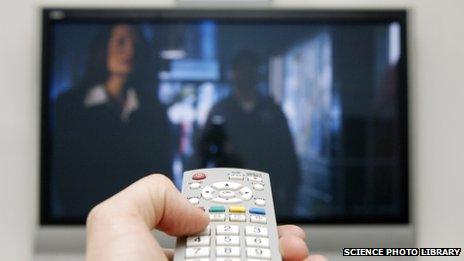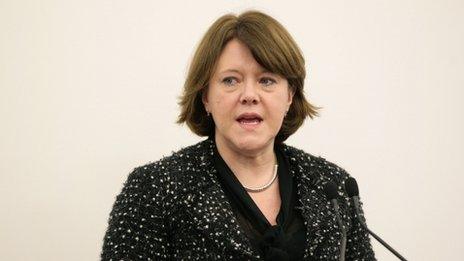TV licence fee non-payment 'could be decriminalised'
- Published
- comments

The licence fee currently costs £145.50 a year
Not paying the TV licence fee could become a civil offence, rather than a criminal one, under plans being considered by ministers.
Culture Secretary Maria Miller said "decriminalisation of the licence fee should be on the table" during the BBC's charter review before 2017.
The BBC said changing the law could lead to more people failing to pay.
In 2012 about 155,000 were convicted and fined for not paying the £145.50 fee.
In total 180,000 people were prosecuted for not paying their licence - which is needed to watch or record live broadcasts on any device, external - accounting for more than one in 10 criminal prosecutions that year.
In October 2013 Huffington Post reported, external that in response to a Freedom of Information Request the Ministry of Justice had revealed that 107 people were jailed between January 2011 and March 2013 for failing to pay fines related to not having a TV licence.
Justice Secretary Chris Grayling has now told the Daily Telegraph "serious work" would be done on the proposal to make non-payment a civil offence, external and that it could ease the pressure on criminal courts.
He said: "The culture secretary and I both agree that this is a really interesting idea - particularly given the pressure on our courts system.
"Our departments will be doing some serious work on the proposal."

Maria Miller said timing on the matter was 'crucial'
Ms Miller said: "This is an interesting idea but timing is crucial and decriminalisation of the licence fee should be on the table during charter review, not separate to the process.''
The BBC's current Royal Charter, which expires in 2016, sets out how it should be funded, what it does and how it is managed.
A spokesman for the culture secretary added: "Maria will put decriminalisation of the licence fee on the table during charter review discussions, but to do it before makes no sense.
"She has made clear that the BBC needs to get its house in order, particularly when it comes to governance and transparency, having decriminalisation on the table during the negotiations will focus the BBC's minds."
But Conservative MP Andrew Bridgen is seeking to introduce the change through an amendment to the government's Deregulation Bill.
It would make non-payment of the licence fee a civil matter, with a fine for offenders set by the government.
He told the Daily Telegraph: "It is outrageous that so many people are brought in to the criminal justice system through this means.
"I believe that non-payment should be treated in the way that parking tickets are.
"It is absurd that the courts are being clogged up by such a minor offence."
The newspaper reported that the amendment had been backed by 101 cross-party MPs.
A BBC spokesman said: "Legislation is a matter for the government, however changing the law could lead to higher evasion.
"Just a 1% increase in evasion would lead to the loss of around £35m, the equivalent of around 10 BBC local radio stations."
- Published24 February 2014
- Published26 February 2014